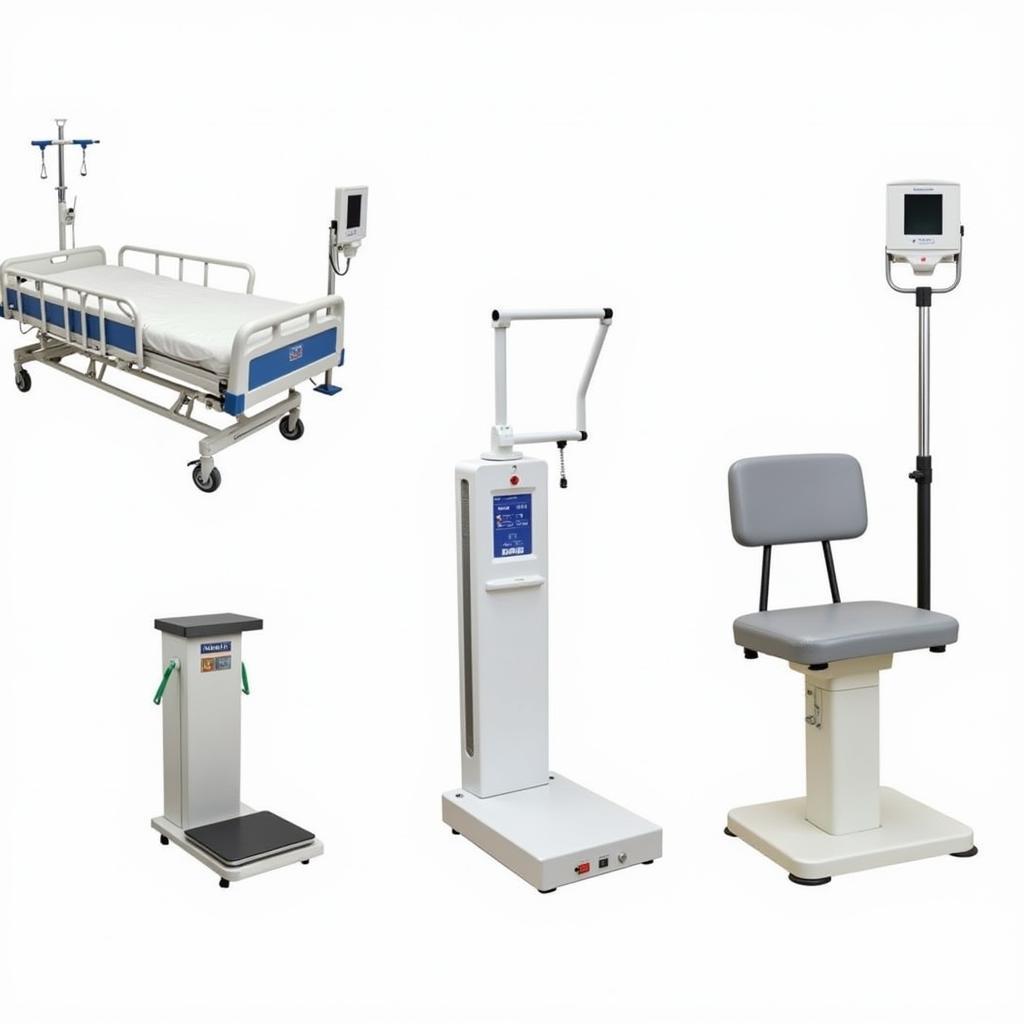Hospital Scale plays a crucial role in patient care, impacting everything from accurate medication dosages to monitoring progress. Finding the right hospital weight scale for your needs involves careful consideration of various factors, from patient comfort and safety to data integration and overall efficiency.
What Exactly is Hospital Scale?
Hospital scales aren’t simply about weighing patients. They represent a sophisticated system designed for precise measurements in a variety of healthcare settings. These scales, ranging from compact hospital bed scale models to larger platform scales, contribute to critical decisions regarding patient health. They provide essential data for diagnostics, treatment planning, and ongoing monitoring of patient progress. Choosing the correct hospital scale is therefore paramount for delivering quality care.
 Different Types of Hospital Scales
Different Types of Hospital Scales
Types of Hospital Scale and Their Applications
Various types of hospital scale cater to specific patient needs and clinical requirements. Understanding these differences helps in selecting the most effective tool. For instance, a hospital bed with scale is ideal for patients with limited mobility, allowing for regular weight monitoring without the need to transfer them. Chair scales cater to those who can sit but have difficulty standing. Platform scales accommodate standing patients and those using wheelchairs or other mobility aids. Specialized scales like infant scales provide accurate measurements for the smallest patients.
Why Precision Matters in Hospital Scale
Accuracy is non-negotiable when it comes to hospital scale. Even slight discrepancies can impact medical decisions, especially for vulnerable patients. Imagine an incorrect dosage based on a faulty weight reading. The consequences could be dire. This is why calibration and regular maintenance are essential to ensure reliable readings.
 Importance of Accurate Hospital Scales
Importance of Accurate Hospital Scales
Choosing the Right Hospital Scale: Key Considerations
When selecting a hospital scale, several factors come into play. Patient comfort and safety should be top priorities. Features like handrails and non-slip surfaces minimize the risk of falls. Data integration is crucial in modern healthcare. Scales that seamlessly connect with electronic medical record systems streamline workflows and reduce manual data entry. Durability and ease of cleaning are also essential for longevity and infection control.
Maintenance and Calibration: Ensuring Long-Term Accuracy
Regular maintenance and calibration are crucial for ensuring the long-term accuracy of hospital scales. Calibration checks should be performed according to manufacturer guidelines. This ensures that the scale remains accurate and reliable, providing consistent and trustworthy data for patient care.
“Accurate weight measurements are the cornerstone of effective patient care, from prescribing medication to monitoring fluid balance,” says Dr. Emily Carter, a leading physician specializing in internal medicine. “Investing in high-quality hospital scales and implementing a robust maintenance schedule are essential for any healthcare facility committed to providing the best possible care.”
 Maintaining Hospital Scales
Maintaining Hospital Scales
The Future of Hospital Scale: Integrating Technology for Enhanced Care
Hospital scale technology is continuously evolving, integrating with other medical devices and systems to provide more comprehensive patient data. Imagine a scale that automatically transmits weight data to a patient’s electronic health record, alerting healthcare providers to any significant fluctuations. Such advancements hold immense potential for improving patient outcomes.
“Integrating hospital scales with other medical technologies offers a unique opportunity to personalize patient care,” adds Dr. Carter. “Real-time data analysis allows for proactive interventions, ultimately leading to better patient outcomes and improved overall health.”
Conclusion
Hospital scale is more than just a weighing device; it’s a crucial tool for providing quality patient care. From accurate medication dosages to monitoring patient progress, the right hospital scale is essential for any healthcare setting. Choosing a reliable, easy-to-use, and technologically advanced scale is an investment in patient well-being.
FAQs
What are the different types of hospital scales available?
How often should a hospital scale be calibrated?
What features should I consider when choosing a hospital scale?
What are the benefits of integrating hospital scale with electronic health records?
How can hospital scale improve patient care?
What is the difference between a hospital bed scale and a platform scale?
For further assistance regarding hospital scale solutions, please contact us at Phone Number: 02437655121, Email: [email protected] or visit us at 298 Cau Dien Street, Minh Khai, Bac Tu Liem, Hanoi, Vietnam. We have a 24/7 customer service team.